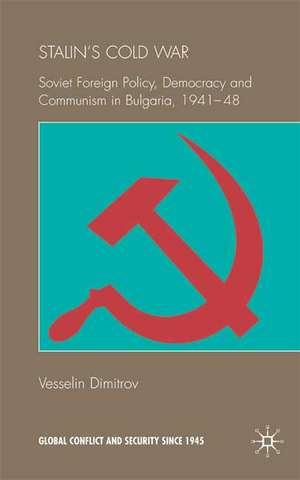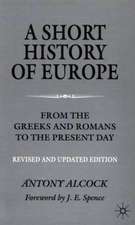Stalin's Cold War: Soviet Foreign Policy, Democracy and Communism in Bulgaria, 1941-48: Global Conflict and Security since 1945
Autor V. Dimitroven Limba Engleză Hardback – 4 dec 2007
| Toate formatele și edițiile | Preț | Express |
|---|---|---|
| Paperback (1) | 383.71 lei 6-8 săpt. | |
| Palgrave Macmillan UK – 2008 | 383.71 lei 6-8 săpt. | |
| Hardback (1) | 388.90 lei 6-8 săpt. | |
| Palgrave Macmillan UK – 4 dec 2007 | 388.90 lei 6-8 săpt. |
Preț: 388.90 lei
Nou
Puncte Express: 583
Preț estimativ în valută:
74.42€ • 77.96$ • 61.67£
74.42€ • 77.96$ • 61.67£
Carte tipărită la comandă
Livrare economică 09-23 aprilie
Preluare comenzi: 021 569.72.76
Specificații
ISBN-13: 9780230521384
ISBN-10: 023052138X
Pagini: 252
Ilustrații: XI, 252 p.
Dimensiuni: 140 x 216 x 20 mm
Greutate: 0.44 kg
Ediția:2008
Editura: Palgrave Macmillan UK
Colecția Palgrave Macmillan
Seria Global Conflict and Security since 1945
Locul publicării:London, United Kingdom
ISBN-10: 023052138X
Pagini: 252
Ilustrații: XI, 252 p.
Dimensiuni: 140 x 216 x 20 mm
Greutate: 0.44 kg
Ediția:2008
Editura: Palgrave Macmillan UK
Colecția Palgrave Macmillan
Seria Global Conflict and Security since 1945
Locul publicării:London, United Kingdom
Cuprins
Introduction: Casting a New Look at the Origins of the Cold War Prelude: Stalin, Dimitrov and the Nazi Threat (1933–41) Great Power Diplomacy, Resistance and Popular Front in Bulgaria (June 1941–September 1944) Wartime Coalition: Unity and Conflict (September 1944–April 1945) The Break-up of the Wartime Coalition (May–August 1945) The Search for Common Ground (September 1945–March 1946) The Hardening of Battle Lines (April–October 1946) Towards Confrontation (October 1946–September 1947) The End of National Communism (September 1947–December 1948) Conclusion: Reinterpreting the Origins of the Cold War
Recenzii
Winner of the Alexander Nove Prize for the best book in Russian, Soviet and Post-Soviet studies published in 2008. The Alexander Nove Prize is awarded by the British Association for Slavonic and East European Studies.
'This book gives us a textured and incisive analysis of Stalin's policies and actions in Eastern Europe. Using the newest archival materials in Moscow and Sofia, Dimitrov portrays Stalin's ambivalence, equivocation, and inconsistencies as well as his paranoia and brutality. He captures the competing strains of thinking in Moscow and vividly portrays how local dynamics in Bulgaria and the Balkans helped shape the diplomacy of the Great Powers. Stalin had no master plan; his actions were contingent, but they were also determinative. Dimitrov paints a complex and vivid picture of local circumstances that enables us to see why the grand alliance of World War II collapsed. This book is indispensable for understanding the origins of the Cold War and the division of Europe.' - Melvyn P. Leffler, Stettinius Professor of American History, University of Virginia
'This book is a magisterial work of scholarship. Based on a thorough reading of Soviet, Bulgarian and other archives it provides an abundance of new information and intelligent analysis. It shows Stalin's policies in an entirely new light, and at the same time it gives masterly insights into the evolution of politics within Bulgaria. It disposes of old myths that matters evolved in a straight trajectory in the Kremlin or in Bulgaria. This is essential reading for anyone who wishes to understand the post-second world war era.' - Richard J Crampton, formerly Professor of East European History, University of Oxford, and Emeritus of St Edmund Hall, Oxford
'This book gives us a textured and incisive analysis of Stalin's policies and actions in Eastern Europe. Using the newest archival materials in Moscow and Sofia, Dimitrov portrays Stalin's ambivalence, equivocation, and inconsistencies as well as his paranoia and brutality. He captures the competing strains of thinking in Moscow and vividly portrays how local dynamics in Bulgaria and the Balkans helped shape the diplomacy of the Great Powers. Stalin had no master plan; his actions were contingent, but they were also determinative. Dimitrov paints a complex and vivid picture of local circumstances that enables us to see why the grand alliance of World War II collapsed. This book is indispensable for understanding the origins of the Cold War and the division of Europe.' - Melvyn P. Leffler, Stettinius Professor of American History, University of Virginia
'This book is a magisterial work of scholarship. Based on a thorough reading of Soviet, Bulgarian and other archives it provides an abundance of new information and intelligent analysis. It shows Stalin's policies in an entirely new light, and at the same time it gives masterly insights into the evolution of politics within Bulgaria. It disposes of old myths that matters evolved in a straight trajectory in the Kremlin or in Bulgaria. This is essential reading for anyone who wishes to understand the post-second world war era.' - Richard J Crampton, formerly Professor of East European History, University of Oxford, and Emeritus of St Edmund Hall, Oxford
Notă biografică
VESSELIN DIMITROV is Reader in the Department of Government at the London School of Economics and Political Science, UK.






















